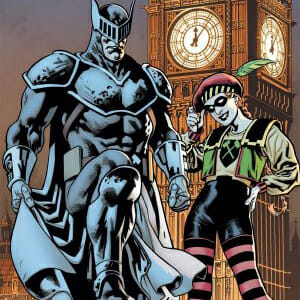Comic Book & Graphic Novel Round-Up (6/29/11)

Each week, Paste reviews the most intriguing comic books, graphic novels, graphic memoirs and other illustrated books.

Knight and Squire by Paul Cornell and Jimmy Broxton
DC Comics, 2011
Rating: 7.5
Oh, Britain: You’re so much like us, but so thoroughly, inconceivably different at the same time. Paul Cornell is British, of course, and that perspective made the short-lived Marvel series Captain Britain and MI:13 stand out among the racks of standard superhero fare. In Batman: Knight and Squire Cornell and artist Jimmy Broxton use the Grant Morrison-created British Batman and Robin analogues as our tour-guides to the UK of the DC Universe, where ages-old rivalries are put on hold at the local pub, and Jarvis Poker, the British Joker, puts a polite and panto-themed veneer of civility on the American original’s nihilism. Each installment of this six issue miniseries (now collected in a trade paperback) introduces a variety of superheroes and villains that riff on British culture. The references are often obscure to non-Britons, but that unfamiliarity nicely echoes that sense of exploration one feels when digging through the expansive and confusing history of DC itself. It’s like picking up a copy of some Silver Age comic you’ve never heard of and discovering a weird footnote of comics history. Knight and Squire isn’t just a fun superhero yarn; it’s a brief glimpse into a shadow comics industry that never existed. (GM)

Eager to Please by Danny Dresden
London Squared Productions, 2011
Rating: 8.2
Yes, that is a self-portrait of a man with a parrot in his underwear on the cover of this new autobiographical collection of tales from Danny Dresden. If you don’t automatically find the image both amusing and perturbing, you’d better not actually open the book, which goes considerably farther into strange territory. Dresden’s accounts of his family’s weirdnesses bring obvious comparisons to Lynda Barry’s work in their deliberately crude form, but they lack the contemplative sadness frequently at the heart of Barry’s comics. Instead, Dresden focuses on transgression, relating stories about his epileptic and developmentally disabled sister (including her sexual relationships), his own failure to get laid due to an impending bowel movement, his series of horrible pets (hence the parrot), and his own experiences teaching English as a second language. It’s tremendously difficult to humiliate yourself and your family for the pleasure of others without coming off as insensitive, and sometimes Dresden fails, but he also often succeeds. It’s necessary, too, for art like this to exist to provide a corrective to the pervading romanticization of family. Consider Dresden perhaps the Louis C.K. of comics: It might look like a disgusting disaster, but that’s because life is exactly such, and we laugh in recognition as much as in terror. (HB)
-

-

-

-

-

-

-

-

-

-

-

-

-

-

-

-

-

-

-

-

-

-

-

-

-

-

-

-

-

-

-

-

-

-

-

-

-

-

-

-










































